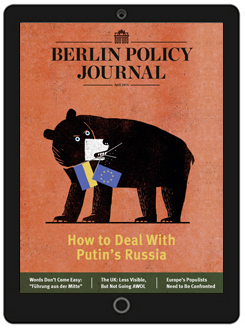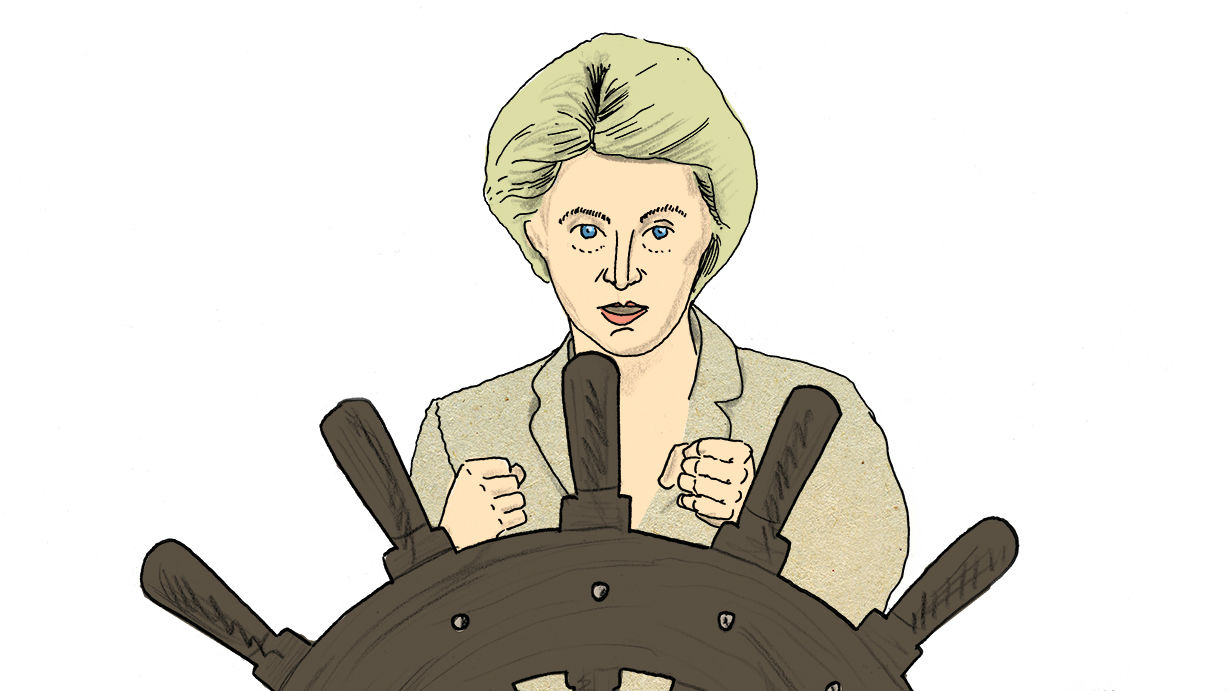Allies, take note: with German leadership you get, and we do apologize for this, the deutsche Sprache – not to mention German thinking, which tends to be, well, complicated, and rarely straightforward enough to conduct proper methodical exegesis – and so you may yet, notwithstanding our very sincere efforts to explain ourselves fully and wherever possible with extensive footnotes and useful diagrams, be sorry you asked. “Man acts as though he were the shaper and master of language, while in fact language remains the master of man,” wrote the German philosopher Martin Heidegger, adding by way of elucidation: das Nichts nichtet. We must admit in all sincerity that this, like many of our deepest ideas, sounds more confusing and less helpful in English: “the nothing nothings.”
Many may associate this concept of leading from the center with the characteristic quiet of Chancellor Angela Merkel – and the <> shape she makes with her hands, fingertips joined together in a rhomboid in front of her navel (or solar plexus chakra, seat of self-confidence and -control), when listening impassively to her Social Democrat coalition partner Sigmar Gabriel; or US President Barack Obama; or EU Commission President Jean-Claude Juncker; or Greek Prime Minister Alexis Tsipras, all of whom keep on talking (and talking …) despite the fact that she has already decided what they are going to do.
But while the defense minister’s ambitions are thought to be – like her self-confidence – essentially limitless, she is undoubtedly aware that her position in the German cabinet is not known as the government’s ejector seat for nothing: since 1949, there have been eight chancellors and 16 defense ministers. She has enough self-control, at least for now, not to be seen as wishing to lead from the center of the cabinet table, since one of the most important lessons from the history of the Merkel era is that such leadership invariably leads to departing the cabinet table entirely. And to be a good German is to learn from history and not be seen as trying too hard, which is uncool.
Meanwhile, Berliners who generally would rather be dead than be thought to be trying too hard at anything – among them tens of thousands of Israelis who have taken up residence in the German capital because they are bored by history (and Israeli chocolate pudding is so much cheaper in Berlin than at home) – may have assumed that Führung aus der Mitte would mean uniforms and armored personnel carriers among the laptop-and-latte crowd in the cafes on Torstrasse, thereby definitely and possibly terminally reducing the coolness of Berlin-Mitte. They, too, need not worry.
No, what Ursula von der Leyen was trying to explain – in, it must be said, teutonically convoluted fashion – was what Germany does not want, namely a) to lead from the front (or, as she called it, “Prussian style”), or b) “dominance over our neighbors” (been there, done that, didn’t work out so well). Führung, she remarked at a recent conference in Brussels, still sounds terrible in German. “Really?” said the moderator. “I have a Führerschein (driver’s license) in my pocket.”
Nor, presumably, does von der Leyen want Germany to “lead from behind,” like Obama in Libya, meaning sitting back, letting allies screw things up, finding yourself forced to deliver weapons anyway, and ending up bombing much of the Middle East on a daily basis.
A quick and highly unscientific Google search reveals that in the business world, “leading from the center” is a recommended technique for middle managers seeking to run their departments efficiently and with a minimum of anomie, subversion, or actual insurrection (think “The Office”). While this fits neatly with German Foreign Minister Frank-Walter Steinmeier’s self-description as Europe’s “Chief Facilitating Officer,” it is perhaps not a felicitous concept when applied to sovereign countries.
To be fair, the concept behind “leading from the center” is as well-meaning as it is appropriate: the idea is that Germany should assume responsibilities commensurate with its power, but that it is also dependent on and vulnerable to its neighbors and partners. Therefore, it must work together with them, offering its own resources to bolster the capacities of others. So far, so gut, as we say.
And high time, too. Germans refused for nearly a quarter-century to accept that the enlargement of the EU and NATO had allowed their country to export its border security problems outward to the periphery of Europe. It took Russia’s armed support of the “separatists” in eastern Ukraine to make them understand why the Balts are afraid. Now Merkel is holding together a European coalition against Putin, but allies still complain that they are not in the room (much less consulted) when Berlin (sporting a French fig leaf) cuts deals like the much-criticized Minsk II agreement with Moscow.
“You’ve come a long way, baby!” – a legendary 1970s advertising slogan – certainly applies to Germany in this case. But it still has quite a way to go. And maybe it needs some better copywriters.
Read more articles from the April 2015 issue FOR FREE in the Berlin Policy Journal App.








